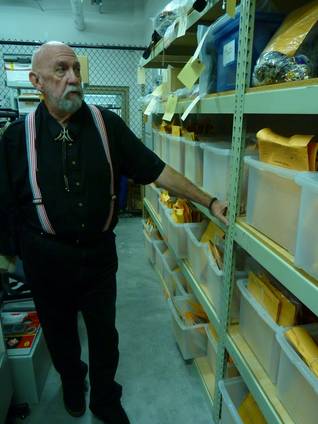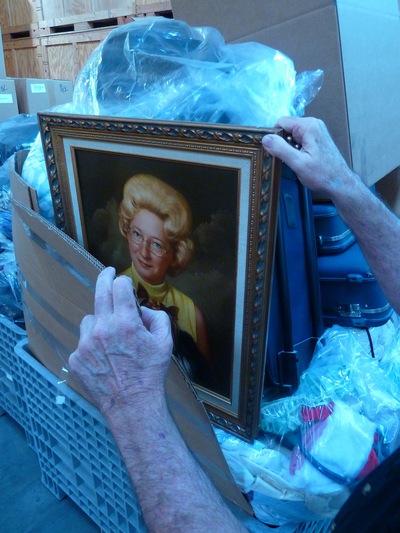
Joe Schoenmann / Las Vegas Sun
John Cahill, Clark County’s public administrator, goes to the homes of the recently deceased, takes inventory and carts away possessions.
Thursday, Oct. 14, 2010 | 2 a.m.
It’s a sunny morning and John Milburn is out again collecting the possessions of the dead.
Milburn is one of the few little-known investigators working for the Clark County public administrator’s office. They enter the homes of the recently deceased, take inventory and cart away possessions until next of kin is located and any legal issues are resolved among the living.
The job is so interesting and little-known that an Encino, Calif., production company wants to film Milburn and his co-workers, hoping to sell a reality TV show pilot to the National Geographic Channel.
Milburn isn’t thinking of his star appeal at the moment, though. He’s tiptoeing through what could become a volatile situation, with a dead man’s estranged wife on the phone and his girlfriend in the apartment begging Milburn not to give the wife the pickup truck. (Good stuff for TV, maybe.)
“All of them are different,” says Milburn, whose voice still betrays an Australian lilt even though he’s lived in Las Vegas since 1965. He’s walking down the steps from Apt. 231 at a Las Vegas Boulevard North apartment complex where the 45-year-old man died last Thursday. He’s loading one of four plastic garbage bags full of the man’s clothes and shoes into his vehicle.
In the apartment, the girlfriend, 44, is in a daze. Like her boyfriend, she is on a heavy regimen of painkillers for chronic back pain. The feeling among those in the apartment, including her daughter, is that the man died from the drugs.
“I think his heart just gave out from all those meds,” the daughter says.
But cause of death is not Milburn’s concern. That’s up to a coroner’s office investigator, who is also there, going through the man’s 15 prescription bottles, an inhaler and Lidoderm patches.
The public administrator is typically summoned by the coroner because of questions about a dead person’s belongings. The office intervenes when there are no known heirs, when a will names the public administrator as estate executor, when an executor doesn’t exist or when the public administrator thinks the deceased property is being wrongly transferred or neglected. In 2009, the office handled 1,062 cases. As of early October, this year’s total was 818 cases.
The man in Apt. 231 lived with his girlfriend but wasn’t legally divorced. So who gets the $30,000 2008 Dodge Ram outside?
The girlfriend tells Milburn she has been paying for it since March. But, she also acknowledges, the man’s wife made the down payment when it was bought in 2008, then made another payment in May.
Milburn calls the wife, who doesn’t live in Nevada, and she wants him to impound it for her. It will be towed to the public administrator’s impound lot.
The girlfriend mildly argues again for the truck. “Can you please fight for me to keep the truck?” she says.
“Well, I can, I can put in the report that you made those payments, I can sure do that,” he says.
He sits at the kitchen table and jots down the man’s possessions — credit cards from his wallet, mostly — then walks to the door and takes one last look at the second-story apartment.
This is part of what the employees of the public administrator’s office call “the last snapshot of a life.” The girlfriend is sitting on the floor, head down; photos of the man with his children and family cover the walls; a large framed drag-racing print hangs in the living room; and tiny drag racing cars in original packaging are tacked to the wall. In the bedroom, two large stuffed Eeyores from “Winnie the Pooh” sit on a shelf in the corner, the window is covered with a pinkish curtain patterned with hearts and Playboy Bunny symbols, and a love letter to his girlfriend is tacked to the wall by the light switch.
Life — and death — might be easier for everyone if there had been a will. “Having a will is so important,” Milburn says. When an estate isn’t worth much, he said, even a handwritten will that’s signed by a witness can eliminate many after-death problems.”
But completing a will is only half the issue.
“For some reason, people hide them and then they never get found or they’re awfully hard to find,” he says. Under a microwave, behind pictures, “all over the place.”
When an estate is worth millions, a will can end years of legal wrangling. Comedian Redd Foxx (“Sanford and Son”) died at 68 in 1991, but Clark County is still the administrator of his “life rights” — the rights to his story, which could be valuable to someone looking to write a book or make a movie about his life.
John Cahill, Clark County’s elected public administrator and Milburn’s boss, said allegations hurled between Foxx’s ex-wife and daughter, and his wife at the time of his death, led to legal action. Foxx owed $3.6 million in taxes when he died, and his widow accused his daughter of spending royalties instead of paying off the debt. Foxx lived on Eastern Avenue in Las Vegas.
“The courts finally said, ‘someone else is going to manage this,’ and that’s how we got involved,” Cahill says.
The county has an offer from Foxx’s ex-wife to buy the life rights, and Cahill’s office is awaiting a court decision.
Wills can also take work away from “heir hunters,” as Cahill calls them. He said these people, often lawyers, troll probate courts awaiting new filings from the public administrator. If court documents indicate the county is looking for an heir to a valuable estate, the hunters start searching, too. If they locate an heir, Cahill says, lawyers offer a deal — cut the lawyers in for up to 40 percent in return for information on the wealthy, dead relative.
Cahill remembers a case in which he filed court documents on Friday, with property valued at $2.2 million. Monday morning a lawyer called and said an heir was found. The lawyer ended up getting $600,000 “for what probably amounted to two days’ work,” Cahill says.
He has enlisted a state lawmaker to introduce a bill in 2011 to limit the practice by first giving the public administrator a year to find an heir.
Most of the left-behinds don’t come close to being worth much of anything beyond sentimental value.
In a 7,500-square-foot warehouse next to the public administrator’s office on Shadow Lane, rows of shelves are packed with duffel bags and luggage full of clothes and other household items, while 5-by-7-foot crates are stacked two high in the middle of the room. These are the trappings of the dead. Collected in August, the crates of someone named Monte contain a slow cooker, decorative peacocks, fabric rolls, 19-inch and 64-inch TVs, mattresses, sofas, a fireplace set, decorative horses and more.
In a large open bin, several framed paintings recline next to framed photos of a woman dressed as a Vegas showgirl. Military discharge papers sit atop a shelf. A framed newspaper article about a Hawaiian developer leans against some luggage.
Most people don’t want these items, but some do. Auctions are held every two weeks to help pay legal fees, taxes and creditor claims left by the deceased. Items that are infested with bugs, stained with bodily fluids or have no sale value are filtered out and sent to the landfill before an auction.
“We usually end up selling everything that goes to auction,” Cahill says.
Auctions would be part of the reality TV show that Encino-based Workaholic Productions wants to produce. In an eight-minute promo video the company put together after following Cahill and his co-workers months ago, auction-goers happily pick through tons of items that include cars, jewelry, gold — a hoarders paradise. Executive Producer Matthew Hickey said the show will appeal to viewers, because no one can escape death and its aftermath.
“We’re all going to die,” Hickey says. “Dealing with it is an odd time in the arc of anyone’s existence. And these guys, they’re kind of unsung heroes.”
At a recent meeting, county commissioners mulled over the $5,000 per episode that Workaholic Productions is offering. They postponed a decision, asking county staff to look at the deal one more time to make sure it was standard in the reality TV industry.
If the show is eventually made, Cahill says he hopes that at the very least it prompts people to come to grips with the inevitable.
“It makes things easier if you have a plan, which is what I always tell people,” he says. “Please, plan ahead.”



Join the Discussion:
Check this out for a full explanation of our conversion to the LiveFyre commenting system and instructions on how to sign up for an account.
Full comments policy